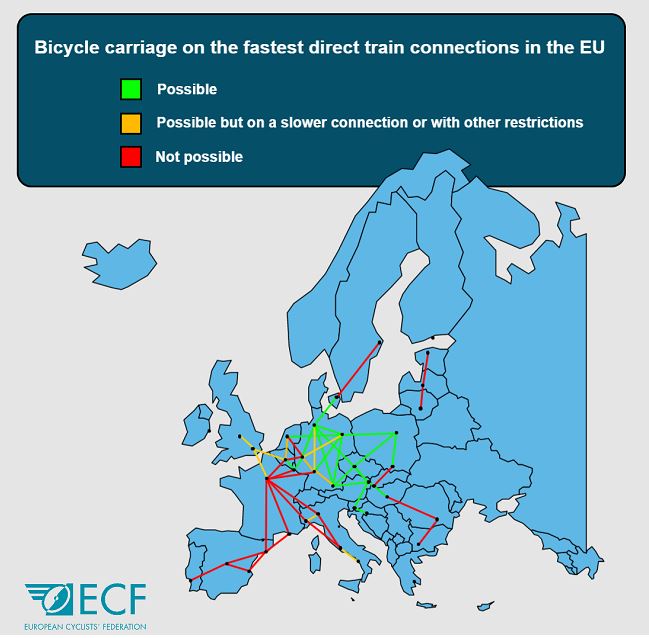
More than half of all major train connections in Europe are not suitable for cyclists
New research by the European Cyclists’ Federation (ECF) shows that rail customers who want to travel with a bicycle face significant obstacles. Our map of bicycle carriage possibilities on the fastest direct train connections in the EU shows that multimodality is not a viable option in Europe yet, as massive disparities still exist. We call on the European institutions to guarantee a dedicated space for at least 8 assembled bicycles on all new and refurbished trains in Europe.
It is currently impossible to carry assembled bicycles on board 53% of the fastest train connections between capitals and large cities in Europe. Indeed, on 33% of these trains, bicycle carriage is outright forbidden and on another 18%, cyclists will need more time to get from A to B than travellers without a bicycle. On average, cyclists lose 2 hours and 45 minutes on train connections between major European cities. However, ECF did discover some good news: 47% of train services customers can bring their bicycles and will not lose any time compared to customers travelling without a bicycle. In particular, rail companies in Germany, Austria and various Central Eastern European countries offer good services to cyclists.
Unfortunately, in Scandinavia and in the Mediterranean area - in particular in France, Italy and Spain - the situation is dire:
- From Copenhagen to Stockholm it is impossible to bring an assembled bicycle on board. Bicycles are only allowed if they can be disassembled or folded and stored in a bicycle bag before embarking, which will only be an option for a limited number of passengers.
-
While the fastest direct connection from Paris to Luxembourg City is only 2h14, it is a whopping 11h48 (+528%) with 3 changes when travelling with a bicycle. This is the worst example ECF has identified.
- Something similar happens in Italy, where 3h10 for a direct connection from Rome to Milan becomes 8h33 (+120%) with 2 changes, for cyclists.
- In Spain, a 2h35 train from Barcelona to Valencia more than doubles to 5h55 with a change (+229%) for passengers with a bike.
Bicycle carriage on trains is regulated through the EU rail passengers’ rights regulation and is currently being revised. Karima Delli, the Chair of the European Parliament Transport Committee said at the ECF online event on June 3:
"We need to finance the mobility of the future to make transport greener, safer and more inclusive. Therefore, the European Parliament is asking for 8 dedicated spaces for bicycles per train in the negotiations on the update of the Rail Passenger Right’s Regulation".
Negotiations between the European institutions to recast this piece of legislation are almost over: now is the time to act. We call on the European Parliament, the European Commission and the Council of the European Union to support these three elements:
- There should be a dedicated space for at least 8 assembled bicycles on trains. It is important that these are assembled bicycles that can be cycled immediately prior to and after the rail journey. Carriage of bicycles in packages and bags, where applicable, should be covered by luggage provisions.
- The policy of at least 8 bicycles should be introduced on all new and refurbished rolling stock through procurement procedures for rolling stock. Railway companies who take the European Green Deal seriously may also want to consider installing a dedicated space for at least 8 bicycles on all existing rolling stock.
- Railways operators should have at most 1 year of time to implement the Regulation.
“While the number of cyclists keeps rising and the European rail network offer is improving, we need to maximise the benefits of both modes by boosting multimodality. Railway operators should facilitate multimodal journeys by allowing passengers to bring bicycles on board: the sum of the two modes combined is greater than their parts alone” stated Morten Kabell, co-CEO of ECF.
The recast of the EU Rail Passengers’ Rights and Obligations Regulation is also an excellent opportunity to improve rail and bicycle solutions as an effective alternative to carbon-intensive car and plane trips.
“The European Commission has the ambition to make Europe the first net-zero carbon emission continent by 2050, as highlighted in the European Green Deal. It has also stressed that train travel should be given special attention, suggesting that next year should be the ‘European Year of Rail’. In order to achieve the 90% CO2 emission reduction in transport by 2050, the Commission will have to extend it to the ‘European Decade of Trains and Bicycles’.” concluded Jill Warren, co-CEO of ECF.
Contact the author
Recent news!
Upcoming events
Contact Us
Avenue des Arts, 7-8
Postal address: Rue de la Charité, 22
1210 Brussels, Belgium









